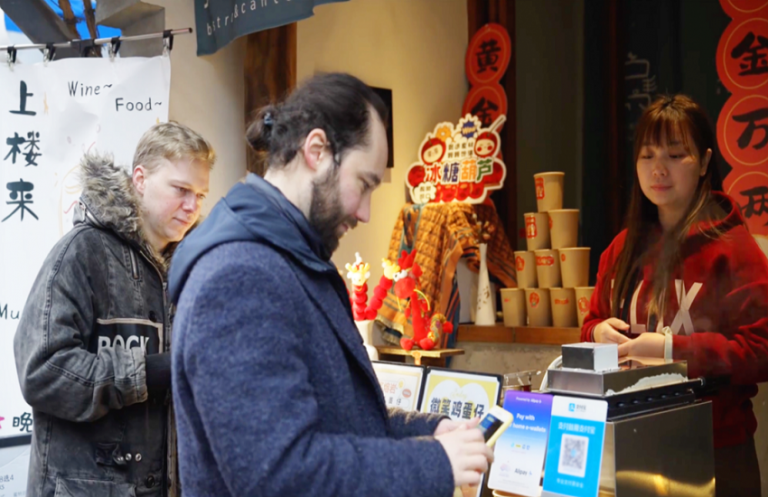
According to Ye Zi, and Peng Xunwen, China has become more enticing for foreigners as the country has concluded mutual visa-exemption agreements covering different passports with more than 150 countries.
Recently, relevant departments in China have released a guideline for payment institutions to improve payment services to meet the demand of foreigners in various scenarios. With the concerted efforts of various parties, the country’s payment services are becoming more convenient, higher quality, and more efficient for foreigners: streamlined procedures for opening bank accounts, registration, and binding overseas bank cards, and acceptance of foreign cards at more key venues and stores.
“A few days ago, I tried to bind my VISA card to WeChat and Alipay, and to my surprise, the whole process was very fast. With no need to verify my identity with my passport, it only took less than one minute to succeed,” said Jack, an Australian, who recently came to China with his Chinese wife to visit her family. He heard from his family that the process of binding foreign bank cards through mobile applications had been simplified, so he decided to give it a try.
Jack had visited China with his wife a few times before, but at that time, it was quite complicated to bind a foreign bank card to Chinese mobile payment platforms. Therefore, he had to give up and let his wife handle the payment each time. “Now, after binding my cards, all I need is a phone when I’m out,” he said.
With the support and guidance of the People’s Bank of China and the State Administration of Foreign Exchange, Alipay and Tenpay (provider of WeChat Pay services) have implemented a series of measures to improve payment services for foreigners in cooperation with commercial banks, clearing agencies, and card organizations since 2023. As a result, foreigners are allowed to bind overseas bank cards to Alipay or WeChat Pay for consumption, and more and more overseas e-wallets can be used in China.
Now, foreigners can use their overseas mobile phone numbers, bank card numbers, etc. to open mobile payment services in China. China UnionPay has established interoperability with nearly 200 overseas e-wallets, which means users of overseas wallets such as K PLUS of Thailand, Naver Pay of South Korea, and GoPayz of Malaysia can make consumption in China. Alipay and Tenpay have allowed users of 13 overseas wallets to make payments in China. In addition, the two platforms have raised the single transaction limit for overseas travelers using mobile payments from $1,000 to $5,000 and lifted the annual cumulative transaction limit from $10,000 to $50,000.
The registration and verification for mobile payment have been further streamlined for foreigners. For instance, overseas users who open an account on WeChat Pay for the first time can make small payments without verification by only binding a foreign bank card. Subsequently, users can choose to complete real-name verification to increase the transaction limit.
Tenpay introduced a tiered verification solution before the Spring Festival this year, where overseas individuals only need to submit simple identity information to directly link their foreign card and make payments in most daily scenarios within a certain limit.
Details of services have been improved. On March 18, Alipay launched a pilot multilingual translation service on its application, expanding from the original two languages of Chinese and English to 16 languages. The translation service can be applied to various scenarios within the application, such as ride-hailing, hotel booking, ticketing of tourist attractions, public transportation, and checking exchange rates.
An executive of Alipay noted that in the future, the focus will be on high-frequency scenarios used by foreign tourists visiting China, and Alipay will introduce more exclusive services for foreign users.
Additionally, Alipay will expand its service coverage to include more card organizations and overseas e-wallets, allowing more foreign tourists to make QR code payments with their e-wallets in China, the executive added.
“Mobile payment in China is very convenient. Now I’ve gotten used to using it. I can scan and pay at restaurants, cafes, and supermarkets, and the exchange rate is shown in real-time,” Jack said.
Foreign currency exchange and cash services are also being improved. China’s State Administration of Foreign Exchange has requested that at least one of the five foreign currency exchange channels should be available in important scenarios such as ports and hotels serving international guests.
Efforts are being made across China. For example, Beijing is improving its ability to accept foreign bank cards at key commercial areas, scenic spots, parks, and hotels; Shanghai has set up a special section on its official website to gather information about payment methods for foreigners, making it convenient for them to find the content they need in a short time; Zhejiang province launched a payment facilitation program for overseas personnel in November 2023, and by the end of February this year, there were already 2.56 million merchants across the province accepting mobile payments from overseas individuals.










